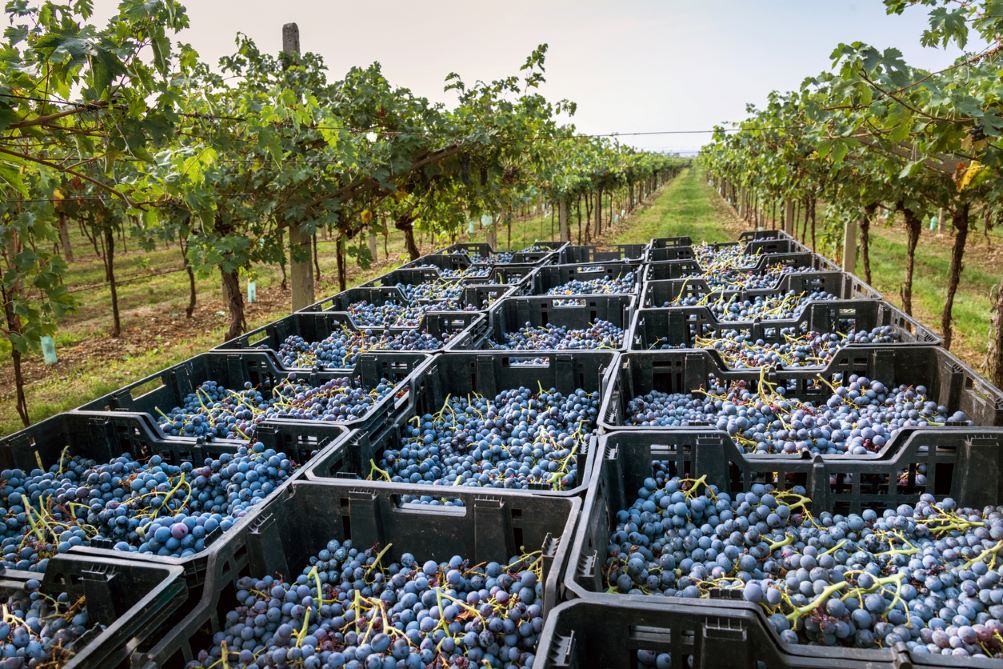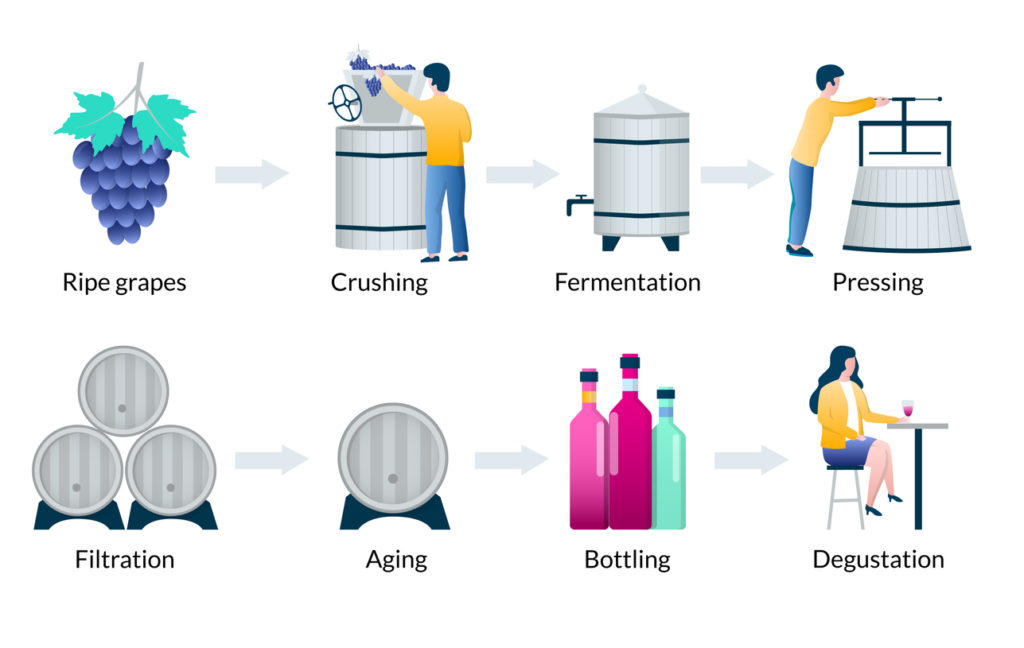Organic red wine and non-organic red wine offer distinct characteristics that appeal to the discerning consumer. While both types of wine can deliver delightful flavors, organic red wine stands out for its commitment to sustainability and environmental responsibility.
By eschewing synthetic pesticides and fertilizers, organic vineyards prioritize the purity of their organic grapes, resulting in a more natural expression of the terroir. This dedication to organic farming practices ultimately contributes to the integrity of the entire winemaking process.
Key Takeaways
- the degree of “organic” depends on the different organic certification
- these range form less harmful for the environment to organic withpout added pesticides or sulfur
- organic wine is better for the environment as less or no artificial pesticides are used
- orgnanic pesticides as herbal teas or formulations can be used against moulds and bacteria
- the number of wineries certified as organic is steadily increasing
Non Organic wines
In contrast, non-organic red wine may incorporate a range of chemical additives and interventions during grape cultivation and fermentation. While this approach can yield wines with consistent flavors and appearances, it raises concerns about potential chemical residues in the final product.

Furthermore, non-organic vineyards may have a larger ecological footprint due to increased reliance on artificial inputs. These factors invite consumers to reflect not only on flavor but also on sustainability when making their wine choices.
What makes a red wine organic wine?
Organic red wine is made from organic grapes that are grown without the use of synthetic pesticides, herbicides, added sulfites or fertilizers. This means that the vineyards and wineries follow strict organic farming practices, focusing on maintaining soil health and biodiversity and are more earth friendly. In addition to being better for the environment and being earth friendly, organic red wine also tends to have higher levels of antioxidants and beneficial compounds due to the natural farming methods used.
How is organic wine made?
Furthermore, many organic red wines are also produced using minimal intervention techniques in the winemaking process. This includes using wild yeast for fermentation, avoiding additives and preservatives, and limiting sulfite use.

These practices result in a purer expression of the grape’s flavors and aromas, showcasing the unique terroir of the vineyard. Overall, choosing organic red wine not only supports sustainable agriculture but also offers consumers a healthier and more authentic experience when they drink organic wines.
What are the benefits of organic red wine?
Organic red wine offers a plethora of benefits, making it an excellent choice for both wine enthusiasts and health-conscious individuals who enjoy it. First and foremost, organic red wine is crafted from grapes grown without the use of synthetic pesticides and fertilizers, resulting in a purer, more natural product.
Is organic Wine better for the Environment
This not only contributes to the preservation of the environment but also ensures that the glass bottle and final product is free from harmful chemicals. Additionally, organic red wine tends to contain higher levels of antioxidants compared to conventional wines, potentially offering greater health benefits such as improved heart health and reduced risk of chronic diseases.

Organic Cabernet Sauvignon in California
When it comes to organic Cabernet Sauvignon in California, three standout wineries consistently deliver exceptional quality and distinct flavors.
Cab Sauv by the Bonterra Winery
Bonterra Winery is a pioneer in organic and biodynamic farming, capturing the essence of their Northern California vineyards in every sip of their Cabernet Sauvignon. Their dedication to sustainable practices shines bright through in the wine’s rich, complex profile, showcasing the unique terroir of Mendocino County.

Frey Vineyards
One of the oldest organic wineries in the US, has been producing outstanding organic Cabernet Sauvignon for decades. Situated in Mendocino County, Frey Vineyards‘ commitment to organic farming and low-intervention winemaking results in a bold and expressive Cabernet Sauvignon that reflects the true character of the region.
Line 39 Wines
Finally, Line 39 Wines embodies the spirit of California with their organic Cabernet Sauvignon sourced from select vineyards across the state. Their meticulous approach to sustainability and quality yields a wine that truly encapsulates the diversity and vibrancy of California’s winegrowing regions.

What does organic Cab Sauv taste like?
When it comes to the aroma of organic versus non-organic Cabernet Sauvignon, there are distinct differences that can have a significant impact on the overall wine experience. Organic Cabernet Sauvignon often exudes a more vibrant and complex aroma, with notes of ripe berries, subtle earthy undertones, and a fresh floral fragrance. This can be attributed to the natural farming practices used in cultivating organic grapes, which result in a more diverse ecosystem and healthier soil.
Organic Pinot Noir in California
Organic Pinot Noir has become a hallmark of California’s winemaking industry, with vineyards like Bonterra leading the charge in sustainable practices. Their commitment to organic farming not only produces exceptional quality organic grapes but also ensures minimal impact on the earth and environment. Additionally, wineries like Schaefer’s Wines and Canihan Wines have embraced this ethos, delivering exquisite Pinot Noir that reflects the unique terroir of the fruit in their respective regions and results in medium bodied wine.
The emphasis on organic methods goes beyond just marketing trends; it speaks to a deeper connection with nature and a desire to honor the land. The result is delicious Pinot Noir wines that are not only rich in flavor but also carry a sense of authenticity and purity.

Taste of Organic Pinot Noir
The aroma of organic Pinot Noir contrasts starkly with that of its non-organic counterpart. The organic variety offers a nuanced bouquet, redolent of dried herbs with earthy notes and hints of vibrant fruitiness. Its aroma unfolds gradually, revealing layers of complexity and subtle herbal undertones. On the other hand, the non-organic Pinot Noir often exudes a more uniform and straightforward scent, lacking the depth and multidimensionality found in its organic counterpart.
Furthermore, the use of chemical pesticides and fertilizers in non-organic viticulture seems to mask some of the grape’s natural aromas, resulting in the fruit with a less distinctive olfactory profile. In contrast, organic methods support an environment where the grapes can fully express themselves through their aroma.

Californian Organic Merlot
When it comes to organic Merlot in California, Bonterra Vineyards takes the spotlight for its commitment to sustainable farming practices. Situated among the majestic Pacific Redwood trees, Bonterra’s vineyards are a testament to the perfect harmony between nature and winemaking. The result is a rich and refreshing full-bodied Merlot that embodies the essence of California’s organic wine movement.
Another notable player in the realm of organic Merlot is Frey Vineyards, whose dedication to biodynamic farming sets them apart in the industry. Located in Mendocino County, Frey combines traditional winemaking with innovative agricultural techniques, resulting in a distinctive expression of Merlot that captures the unique terroir of their vineyard.

With an emphasis on environmental stewardship and holistic farming practices, Frey sets a benchmark for sustainable winemaking in California.
Does Organic Red Wine tast better than non-Organic Red Wine?
Organic wine has been gaining popularity in recent years, with claims that it offers a superior taste to non-organic varieties. The reality is that the difference in taste between organic red blend and non-organic red wines is not always clear-cut. While some may argue that organic wines have a purer taste due to the absence of synthetic ingredients and chemicals, others argue that non-organic wines can also boast complex flavors and aromas.

The body of a wine, whether organic or not, depends on factors such as grape variety, terroir, and winemaking techniques. Therefore, the very light to medium body of an organic wine may be similar to that of a non-organic counterpart.
The true distinction may lie in the farming practices used in cultivating organic grapes, which can contribute to a more nuanced and balanced flavor profile. Ultimately, whether organic red wine tastes better than non-organic wine is subjective and depends on individual preferences.

